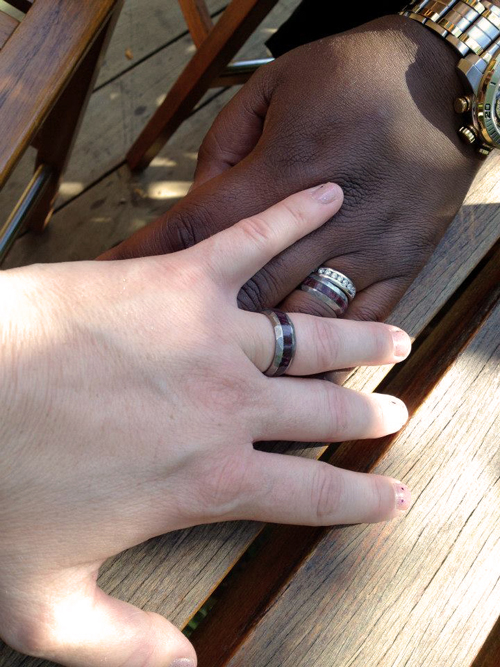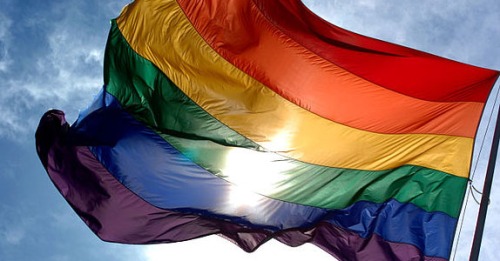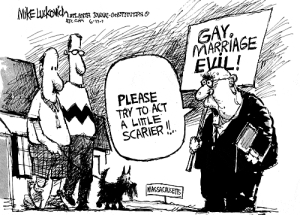by Jay Parr

Well, it’s getting to be election season again. I’m sure you’ve noticed. Fox News hosted the first “debate” recently, and there are, what, seventeen candidates going after the Republican nomination now? At least on the Democratic side it’s mostly Hillary against that plucky underdog Bernie Sanders. That is, unless Uncle Joe decides to throw in his hat.
So I’ve decided it’s time for me to announce this: Under no circumstances will I be running for the office of President of the United States of America. No way. Just ain’t gonna happen. Or, to paraphrase that old Sherman dude, if nominated I will not run, if elected I will not serve.
First of all I was an adventurous and nonconformist poor kid in my teens and twenties (okay, and thirties). There’s way too much dirt to be dug up on me. Sure, my response to most of it would be, “Yeah? And?” But no one wants their friends to end up becoming collateral damage, right?

That and I really have no stomach for the machinations of politics. I get a bellyful of politics and diplomacy just trying to advocate for our students, here in my bottom-rung administrative position for the BLS Program. If I had the entirety of Congress trying to stymie me at every turn (Every. Single. Turn.), I would probably either have a psychological breakdown or a psychotic break. Think, “Hammer-Wielding President Rampages Through Capital!”
Anyway, it’s still fun to think about what one would do as the “leader of the free world,” so why not?
I’m thinking my campaign slogan would have to be SHAMELESSLY LIBERAL. Something along those lines anyway, and I don’t think “What a Pinko” has quite the right tone for a presidential campaign.
Anyway, I hear you say. Enough of this navel gazing, what would you do?!

Universal Health Care: Single-payer style. You need a doctor, you go to a doctor. Doesn’t matter if you’re a billionaire or homeless, a veteran or an artist. Every citizen, every veteran, every President, every billionaire, every college student, every crack addict, every member of Congress (yes, every member of Congress), has the same level of coverage. I am firmly of the opinion that for-profit health insurance and for-profit medicine are among our great societal evils, in that they profit handsomely on the misfortunes of others. So let’s take them out of the picture; you go get the medical care you need, and your taxes pay your doctors’ salaries. Yes, your taxes will go up. Yes, the doctors’ gross incomes will go down. You’ll still be paying less for your healthcare, and your doctor will still be making the same net income, maybe more, after our taxes also pay for her education. Which brings me to…

Access to Education: At any level. Free of charge. Any student who is doing reasonably well can attend any public university, in-state or out-of-state, to any level, absolutely free, with a stipend for living expenses, and can finish a BA, an MA, an MFA, an MDiv, a PhD, a JD, an EdD, or what have you, and walk away totally debt-free. Also paid for by our taxes. It’s not as expensive as you might think (a fraction of our annual spending on our recent wars, less than we spend incarcerating nonviolent offenders), and in the long run it is simply in the best interest of the nation to invest in an educated populace. Educated people contribute more to their communities and to their countries, both in tangible contributions to GDP and in intangible contributions to quality of life. When the reason a talented and motivated young person doesn’t pursue her PhD in engineering is because her family’s working-class background makes it financially untenable, it’s not just that child that suffers. It’s all of us. When the person who would have discovered the cure for diabetes is stuck flipping burgers in West Cowtown because the cost of education is prohibitive, it’s not just she and her family that suffers. It’s all of us. When the poor black kid from Baltimore starts his lifelong career in the corrections system at fourteen simply because he is presumed to be a criminal by everyone he meets, that’s one more life lost. One less chance for the world to have its next once-in-a-century artist, musician, scientist, statesman, what have you, and at a cost several times higher than providing him with a top-notch education.

Campaign Finance Reform: The billionaire Koch brothers want to eliminate all limits on campaign contributions so that the wealthiest citizens can basically buy the government. I want the opposite. At the very least I would like to see individual donations limited, and corporate donations and superpacs eliminated altogether. I even like the idea of going a step further and requiring candidates to campaign under uniform conditions (think of NASCAR’s equipment restrictions): Each candidate campaigns through a standardized system supported by tax dollars, through which their sponsored bills and voting records are shown, they have the opportunity to comment on their votes, and they can make positional statements. Advertising reminds voters to study the candidates, make their choices, and to vote on election day. And hey, let’s make election day a national holiday while we’re at it.

Automatic Voter Registration: Oregon just did it. We can do it nationally. Anyone who is eligible to vote is automatically registered upon receiving a driver’s license or state-issued identification card. Other mechanisms may also be explored to catch the people who have neither (e.g., Social Security rosters). The idea is that anyone who is eligible to vote is registered by default. To further encourage participation, it would be worth exploring a small stipend for each voter, to be issued when the ballot is cast at the polls (or when the absentee ballot is processed). For less than the costs of recent campaigns, each voter could be offered a few bucks to encourage her to actually show up and vote. Democracy simply doesn’t work when most of the population doesn’t bother to vote.

Eliminate the Political Party System: The party system mostly works to keep representatives in line with the wishes of an elite power base. Independent candidates are rarely elected (there are 2 in Congress, out of 535 members), and that leads anyone with political aspirations to align themselves with one major party or the other. From that moment they endure pressure to vote certain ways on specific items of legislation and even on whole issues. This pressure, in effect, means they can no longer represent their constituencies or even their own consciences, because they are beholden to represent their political party. When there are no sides of the aisle, no party affiliations, that pressure is removed and the candidate can run, and the representative can represent, according to their own convictions and the wishes of their constituencies.

Eliminate Corporate Lobbying: Another method by which a monied few exercise disproportionate influence on political outcomes. No energy-policy debate can be balanced when petroleum-industry interests are pouring hundreds of millions of dollars into lobbying efforts. Likewise, no healthcare-policy debate can be balanced when insurance-industry interests are doing the same. Lobbying is a $3,250,000,000.00-per-year business. That’s over a thousand dollars a year for every single person in the country. Imagine what could be done with that money if it weren’t being used to skew political outcomes in the favor of the wealthiest individuals and corporations.

Restructure Congress: In 1789, there were about 30,000 constituents per representative in the House. Today, there are some 700,000 constituents per representative. That makes each seat more powerful and thus more subject to big-money influence. It’s time to go back to representatives who actually know their constituencies; in today’s world of teleconferencing and telecommuting, we could easily go back to one representative for every 30,000 constituents. Yes, that would make the House some 10,000 members. No, it would not be necessary to assemble a 10,000-member House of Representatives at the Capital building for every session of Congress. Each member could work from a local office in her district, accessible to her constituents. That office could be her designated location for voting and for filing legislative documents. Floor debate could be held with a combination of in-person and electronic attendance. A representative could serve her entire term, in fact, without ever setting foot inside the Beltway.

Eliminate the Senate: Having two senators per state skews senatorial representation in favor of the less populous states: Montana, Wyoming, North Dakota, South Dakota, Alaska, Delaware, and Vermont each have only one representative in the House, and they each have two senators. California, with 53 representatives and a far greater population than those seven states added together, also has two senators. Further, having two senators who represent a large and wealthy state means those senators are far more likely to be influenced by big-money interests within their states (and maybe even from outside their states). Basically, senatorial representation is in no way representative of the populace, and is far too subject to big-money interests. It’s a throwback, a mimicry of the equally non-representative House of Lords. Let’s get rid of it.

Marriage Equality: Wait, I hear you say. The Supreme Court just did that. Well, not exactly, and not completely. Yes, Obergefell v. Hodges was definitely a step in the right direction, but a Supreme Court ruling is an interpretation of constitutional law. It is not, and should not be, federal law or even federal policy. The ruling also has its limitations, and I’m sure you’ve heard about folks agitating to resist, or ignore, or otherwise malign the Supreme Court’s authority in this matter. I’d like to put an end to all that.
The first order of business would be separation of church and state in the marriage business. A couple of ways this could be done: 1) Perform all legal marriages in the courts, as is done in Mexico, and let the spouses also have a non-legally-binding church ceremony if they’re so motivated; or 2) Separate the role of officiant (i.e., representative of the state in the matter of the marriage to be performed) from that of ordained clergy (i.e., representative of the church), and create a process by which a person can have herself authorized to officiate a wedding ceremony. Anyone would go through the same process, ordained clergy or otherwise, but it would be a separate process, a legal process, and the role of officiant would be understood to be (and literally) a legal role independent of any religious ordination.

On the matter of marriage equality, I would also go a step further than simply same-sex marriages. Marriage equality needs to be for everyone. As marriage is the legal codification of a committed relationship, and the legal status carries certain rights and benefits, the legal framework should accommodate any configuration of committed relationship. This means not only same-sex marriage, but nonbinary-gender relationships and consensual polygamy in any configuration (polygyny, polyandry, or other polyamorous arrangements). I don’t have this all sorted out, because I’m not a gender-studies person and the math can get complicated in a hurry, but the basic idea is that there is a status for spouse and one for co-spouse, and that the legal rights carry between anyone in that status (and yes, in theory, one could be in more than one multiple marriage, with branching relationships of co-spouses in either direction). My one caveat would be that all parties in the marriage would be required to sign the license to add a new member.

A Legal Third Gender: Here are the facts: Not all people identify as the gender they are assigned at birth. Not all people identify as either gender. Not all people even fit into binary gender categories at birth (i.e., intersex). There needs to be a legal gender category for people who don’t fit into that binary. I like “nonbinary” as a catch-all term, myself (“other” is, after all, quite literally othering). And yes, there are countless subdivisions of nonbinary gender, but in the end it’s a small enough population that I’m inclined to think one catch-all category is sufficient for most legal purposes (I’m talking driver’s licenses and the like) . Of course, finer distinctions can be made where they’re called for, but any legal document that notes gender needs to have a nonbinary option.

End Mass Incarceration: We love to call ourselves the “land of the free,” and yet we have an embarrassing percentage of our population incarcerated, most of them minorities, and most of them for nonviolent crimes. Zero-tolerance drug laws, three-strikes policies, and other hardline legislation mean a lot of people are serving years- and decades-long sentences over petty lifestyle offenses and what I like to call crimes of poverty. Oh, and it costs us a ridiculous amount of money. As in, enough money to make college free for every student in the country. Justice would be better served, and in the long run it would cost us a lot less money, if the majority of those prisoners had their sentences lifted. Of course, amnesty isn’t quite that simple, as most of those prisoners, by virtue of their disadvantages from having been prisoners, will need financial support and career rehabilitation to help them get reestablished in society. In the short term, implementing such an amnesty policy would be herculean, but it shouldn’t be necessary in the first place. So here are some thoughts on how to correct the situation in the long term.

End the War on Drugs: The War on Drugs hasn’t done a whole lot to reduce drug use in this country. Most of what it has accomplished (aside from creating an enormous prison population) is to drive the black market for drugs further underground and make it more violent. Prohibition taught us that illegal distribution creates violent gangs, whereas legal distribution creates a peaceful business culture. It also taught us that, all moral objections aside, where there is demand for a product or a service, someone will provide a supply. The demand for weed isn’t going away. Neither, unfortunately, is the demand for harder drugs such as heroin, cocaine, crack, meth, et cetera. The solution is not to attack the suppliers of those demands with militarized law-enforcement agencies. All that does is create a militarized black market. Instead, we should allow businesses to create legal, taxed, and regulated supply streams, at prices that can out-compete the black markets, and let the economy run its course (how often do we see black-market liquor these days?). Instead of sinking revenue into futile attempts at enforcement, we generate tax revenue, which we in turn use to discourage the more violent elements of the market, and to provide quality rehabilitation services to those who need them.

Decriminalize Prostitution: Most people who engage in prostitution do so because they have little choice. We must create a legal system which protects those sex workers from further harm and recognizes their vulnerability to abuse, instead of criminalizing them for engaging in what may well have been a last resort for survival. Sex workers should be able to come to law-enforcement agencies knowing that they will find sympathetic advocates. The current reality is that most sex workers find themselves unprotected, in lawless conditions, because approaching law-enforcement agencies will most likely result in slut-shaming and denigration at best, and arrest and imprisonment at worst.
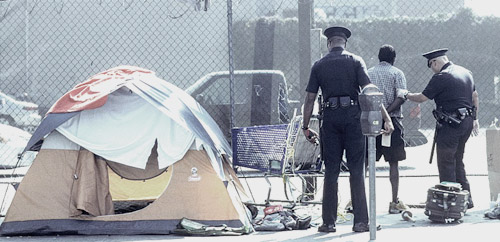
Decriminalize Poverty: Let’s face it, in the final analysis the vast majority of people in prison are there because they are poor (and minorities). The wealthy Duke student gets busted with ten grams of weed, his family knows a good lawyer who keeps the kid out of jail, and maybe successfully argues to have the arrest expunged because, you know, wouldn’t want to ruin the kid’s career potential over a youthful indiscretion. The poor black kid from a bad Durham neighborhood gets busted with the same ten grams of weed, the entire system presumes it to be one sign of a larger pattern of criminality (not helped by the fact that he’s not very good at code-switching into white “civilized” speech), he gets assigned a green public defender straight out of a bottom-tier law school, and there’s that time he got busted for throwing a rock at a cop car on a dare, and next thing you know the kid’s serving a good chunk of his twenties in county.

Outlaw Private Prisons: The incarceration of prisoners should never be a for-profit business, and allowing it to run as such only encourages prisoner abuse. The corrections system also allows prisoners to be paid well below minimum wage for assigned work; combine that with a for-profit prison and you basically have slave labor.
End Capital Punishment: Two words: Posthumous exoneration.

Police Reform: It has become obvious to me that there needs to be a sea-change in the attitudes of police agencies. There seems to be a default assumption of criminality on the part of law-enforcement personnel in far too many of their interactions with the citizenry. Police departments need to be demilitarized, and shows of military-grade force on the part of police departments needs to come to a stop nationwide. Right now. The climate of policing needs to shift such that police personnel interact with the public from an assumption of innocence, that the person they are facing, even the person they are detaining, is a fellow citizen trying to do his best to get by. Even if he runs. Gunfire should be reserved for situations in which the officer or nearby civilians are actively under threat of imminent harm. I’m even starting to wonder if the average beat cop may even be better off without that sidearm. That will bring me to my ideas on gun control in a bit.
But first, I think policing could be improved with a couple of other little adjustments. First, fine revenue should be divorced from municipal budgets in such a way as to remove any pressure on police personnel to generate fines (and most fines should be eliminated anyway, as they disproportionately impact people with lower incomes). There should be no room for even the perception that a police officer’s primary role is to ticket law-abiding citizens for minor offenses. I also think a lot could be done for the quality of policing if the starting salary were somewhere in the range of $50,000.

Gun Control: I’m going to lose some people here. I’m okay with that. I’ve hit on an idea that I think might help reduce some of the insane gun violence in our country without inciting the “well-regulated militia” to revolt. Here it is: You get to keep your guns. No one is going to come and take them away from you. Some of them might become a little harder to buy in the future, and some of them you may not be able to sell to anyone but the government for destruction. But you can keep them. The catch: If you have that firearm in public it must be unloaded and in a locked case. If the firing chamber can be disassembled without tools, it must be disassembled. If you have ammunition, it must be in a separate locked case. That way, you can still go hunt on private property or shoot at the firing range. But if anyone walks into a big-box store with a holster on her hip, or walks down the street with a rifle on his back, we don’t have to wonder if that is someone about to go on a killing spree or a law-abiding citizen who just happens to be an open-carry activist. Because anyone in public with an uncased and loaded firearm is not a law-abiding citizen. Possession of an uncased firearm would be a primary offense under this law (which is to say you could be arrested on sight for it), and such possession within sight-lines of a school, hospital, place of worship, shopping area, performance venue, or other public gathering place would be a felony.

Immigration reform: A path to citizenship for dreamers and past illegal immigrants, and reasonably open borders for people who would come to live and work in the United States. As with drugs and prostitution, I am essentially proposing a legal path for what is already happening on the black market, and a recognition that our current laws tend to criminalize actions taken out of sheer necessity. As things are, illegal immigrants are literally second-class citizens in this country. Our immigration and naturalization system considers the fact that they are in the US illegally more important than anything they may come to law enforcement agencies about, be it that they were cheated out of pay for work they’ve done, or that they were detained, imprisoned, and forced into slave labor, or even that they were raped, physically abused, and forced into prostitution.

And So Much More: Comprehensive sex education and free, no-questions access to contraception for students. Close GITMO (not like Obama didn’t), not just the prison camp but the whole base, and give the land back to Cuba. While we’re at it, close all our bases in foreign nations where our presence is a signal of oppression and not cooperative peacekeeping. End our involvement in sundry military engagements, significantly downsize our standing military, divert those funds into improving the quality of life in our own country and taking care of the veterans who have made lifelong sacrifices in the line of duty. End subsidies for fossil fuels and subsidize development of domestic renewable energy sources. Subsidize a shift away from point-source power plants to distributed generation and storage of energy (rooftop solar, neighborhood-level wind generation and power storage). Subsidies to encourage the development of offshore wind and desert solar generation. Mass transportation at a level that can effectively compete with personal transportation, both on a local level and on a city-to-city level. Road-use taxes and fees to subsidize mass transportation and encourage use of alternative, non-car modes of transportation. A legal class of intermediate city vehicle between the highway-rated passenger car and the 25-mph NEV (“neighborhood electric vehicle,” essentially a golf cart).

As it turns out, putting together a platform for president means thinking deeply about a whole lot of issues. I’m gaining on 4,000 words here and still haven’t addressed any number of major issues. But I’m done. I’ve run long, I’ve run out of time, and I’m not really running for president anyway so I don’t even have to answer your questions if I don’t feel like it. And of course, these are all just my opinions. Some of them are more thought-out than others. Some of them may be downright uninformed, but that hasn’t stopped any number of presidents from doing any number of things in the past. The ideas in this post have been a long time in the making, and I am glad to see certain candidates talking about some of these ideas, and calling attention to a lot of things that have been very wrong for a very long time. I am even glad to see our sitting president, with whom I have had my disagreements, using his lame-duck position to get serious about some of the things that he has been talking about for a long time.
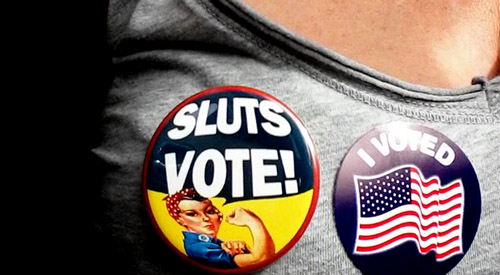
And I will leave you with this: No matter your political convictions, please please please (please!) take the time to keep yourself politically informed, to research your candidates, and at the very least, to get out on election day and vote. Democracy only works if the people participate. Otherwise, it reverts back to some form of plutocracy, in which the wealthy hold all the political power and we hoi-polloi become more and more disenfranchised. So for the love of all that is sacred and holy, please, vote! Or to put it a different way…











